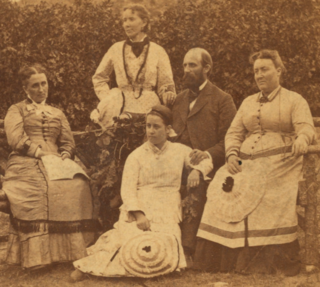Related Research Articles

Polygamy was practiced by leaders of the Church of Jesus Christ of Latter-day Saints for more than half of the 19th century, and practiced publicly from 1852 to 1890 by between 20 and 30 percent of Latter-day Saint families.

In a culture where only monogamous relationships are legally recognized, bigamy is the act of entering into a marriage with one person while still legally married to another. A legal or de facto separation of the couple does not alter their marital status as married persons. In the case of a person in the process of divorcing their spouse, that person is taken to be legally married until such time as the divorce becomes final or absolute under the law of the relevant jurisdiction. Bigamy laws do not apply to couples in a de facto or cohabitation relationship, or that enter such relationships when one is legally married. If the prior marriage is for any reason void, the couple is not married, and hence each party is free to marry another without falling foul of the bigamy laws.

Under civil law, Nigeria does not recognize polygamous unions. However, 12 out of the 36 Nigerian states recognize polygamous marriages as being equivalent to monogamous marriages. All twelve states are governed by Sharia law. The states, which are all northern, include the states of Bauchi, Borno, Gombe, Jigawa, Kaduna, Kano, Katsina, Kebbi, Niger, Sokoto, Yobe, and Zamfara which allows for a man to take more than one wife.
Polygamy is illegal in France and has been the center of recent political debates, due to surges of Malian immigrants living polygamously in the country. Due to such, stricter laws have been enforced to stomp out polygamy.
The current status of polygamy is difficult to determine in Botswana as, legally, only marriage between a single man and woman is permissible, though there is a notable loophole. A man can marry his first wife under customary law, while then marrying his second under civil law. While the practice was thought to have long disappeared from the region, it has been noted that polygamous unions are still active in Botswana, though not particularly common. Polygamous unions in the nation do not have any more effect in the areas such as divorce battles, sexual abuse and a higher spread of HIV/AIDS than any other relationship style. A lack of proper health care and unprotected sex leads to a higher spread of STDs of all kinds, which is a problem to begin with in the country.
While polygamous marriages are not legally recognized under the civil marriage laws of Namibia, a bill was successfully passed in 2003, based on the model in South Africa, which recognizes polygamous unions under customary law; affording a generous amount of benefits to polygamous unions, ranging from inheritance rights to child custody. It has been estimated that nearly one in seven women in Namibia live in polygamous relationships, which has resulted in large numbers of unmarried men.
While polygamous marriages are not legally recognized under Malawi's civil marriage laws, customary law affords a generous amount of benefits to polygamous unions, ranging from inheritance rights to child custody. It has been estimated that nearly one in five women in Malawi live in polygamous relationships.
Polygamy is legal under certain circumstances in South Africa. All polygamous marriages entered into in accordance with the provisions of the Recognition of Customary Marriages Act are legal. The husband in an existing customary marriage wishing to marry a second wife must apply to a competent court for such a marriage to be legal. Hence former President Jacob Zuma currently has four legally-recognised wives. The court considers the interests of all parties to the marriage and may add whatever conditions the court deems just for the polygamous marriage to be valid under customary law. Polygamous marriages are not allowed under the Marriage Act and the Civil Unions Act.
Polygamy is legal in Indonesia, the largest Muslim population in the world. Polygamy in Indonesia is not just practiced by Muslims, but also customarily done by non-Muslim minorities, such as the Balinese and the Papuans.
The legal status of polygamy varies widely around the world. Polygyny is legal in 58 out of nearly 200 sovereign states, the vast majority of them being Muslim-majority countries. Some countries that permit polygamy have restrictions, such as requiring the first wife to give her consent.
Polygamy is not legally recognised in Australia. Legally recognised polygamous marriages may not be performed in Australia, and a person who marries another person, knowing that the previous marriage is still subsisting, commits an offence of bigamy under section 94 of the Marriage Act 1961, which carries a maximum penalty of 5 years imprisonment. However, the offence of bigamy only applies to attempts to contract a legally recognised marriage; it does not apply to polygamous marriages where there is no attempt to gain recognition for the marriage under Australian law. Whether or not either or both partners were aware of the previous subsisting marriage, the second marriage is void. Foreign polygamous marriages are not recognized in Australia. However, a foreign marriage that is not polygamous but could potentially become polygamous at a later date under the law of the country where the marriage took place is recognized in Australia while any subsequent polygamous marriage is not. While under Australian law a person can be in at most one legally valid marriage at a time, Australian law does recognise that a person can be in multiple de facto relationships concurrently, and as such entitled to the legal rights extended to members of de facto relationships.
Polygamy and civil polygamous marriages are legal in Bangladesh but restricted according to a law of 1961, though the practice is rapidly declining. According to a Pew Research Center study, less than 1% of Bangladeshi men are in polygamous marriage, much lower than the average rate found in other nations that permit polygamy. Certain cities have also placed hefty taxes on the practice of polygamy, with the tax increasing per each new wife the man takes. A Bangladeshi Muslim man can marry up to four wives at the same time but must have permission from existing wives. There is no known limit for the number of wives a Hindu man can take in Bangladesh.
Polygamy is the practice of having more than one spouse; while prohibited under Zimbabwean civil law, polygamous marriages may be performed under the country's customary law. Less than one-fifth of the country's population are engaged in polygamy.
The practice of polygamy has had a long history in Kazakhstan, which officially decriminalized the practice in 1998, being the only Central Asian country to do so. Polygamous marriages are not recognized under the law, but bigamy is not a crime. In practice, polygamy is common in Kazakhstan, and is often seen as a sign of a man's social prestige.
Polygamy is illegal in Ghana, but the restrictions are not heavily enforced. Polygamous marriages are illegal under civil law, though are arguably considered to be legal under customary law. Despite these exceptions, there have been no reports of a legally contracted polygamous marriage in Ghana; and are considered to be "de facto" illegal. An estimated 22% of Ghanaian women live polygamously.
Polygamy is prohibited by law in Turkmenistan and legal framework does not provide for polygamous marriages under civil law nor customary law. Despite such illegalities, there have been a handful of debates, with a proposed polygamous marriage bill voted down by the upper house in 2007.
PolygamyinTajikistan is illegal, and the law does not provide for any form of legally recognized polygamous marriage or union. Similar to the situation in neighboring countries, polygamy is quite prevalent in Tajikistan due to significant gender imbalance in the country. According to reports in 2006, the practice is apparently on the rise. There has also been debate about legalizing polygamous civil marriage in the country.
Although polygamy is officially illegal in Angola, the practice is known to be widely socially acceptable and very prevalent among the Angolan population. Many women live polygamously due to the shortage of men since the civil war. Angola does not recognize polygamous marriages under civil law or customary law.

Polygamous marriages may not be performed in New Zealand. A married person who enters into another marriage in New Zealand is guilty of the crime of bigamy. Similar rules apply for civil unions, which have been legal in New Zealand since 2005. However, polygamous marriages legally performed in another country have limited recognition in New Zealand law, provided that no person involved was living in New Zealand at the time of the union.
Polygamy in Guinea is generally illegal. Polygamy is regulated under the new 2019 family law. The new regulations stipulate that a marriage is presumed to be monogamous; however a couple may legally enter into a polygynous marriage if the groom declares that he is opting for polygyny during the marriage ceremony and the bride gives "explicit consent". The new law is the result of a long legislative battle between those who wanted free polygamy without restrictions and those who wanted a complete ban.